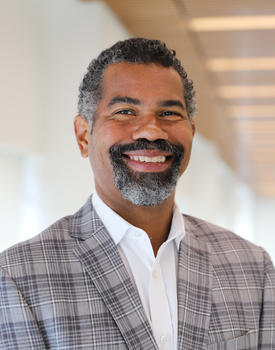
High profile sporting events like the Winter Olympics and March Madness are times to celebrate the amazing accomplishment of athletes—and to ensure that all athletes receive the mental health support they need.
Emmett Gill, term assistant professor of Social Work at George Mason University, wants to shed more light on the mental health of athletes, particularly Black and Brown athletes.
“Athletes, and people in general, feel that if you go to a mental health professional then you’re broken, and something is wrong with you, but that’s not the case,” said Gill.
In addition to teaching Mason courses in alcohol and substance abuse and behavioral health, Gill teaches workshops on the impact of racism on athlete mental health and is developing an app to focus on athlete wellness.
Emmett Gill is a term assistant professor of Social Work in George Mason’s College of Health and Human Services. His expertise is in the areas of diversity, equity, inclusion, and social justice in sports. Prior to joining Mason, he worked for NFL Lifeline. He has also served as a faculty member and supported athletics for Rutgers University, North Carolina Central, and the University of Texas at Austin. A licensed social worker, Gill is also a founding member of the Alliance of Social Workers in Sports. He can be reached at egill7@gmu.edu.
For more information, contact Michelle Thompson at 703-993-3485 or mthomp7@gmu.edu.
About George Mason
George Mason University is Virginia’s largest public research university. Located near Washington, D.C., Mason enrolls more than 39,000 students from 130 countries and all 50 states. Mason has grown rapidly over the past half-century and is recognized for its innovation and entrepreneurship, remarkable diversity, and commitment to accessibility.
About the College of Health and Human Services
George Mason University's College of Health and Human Services prepares students to become leaders and shape the public's health through academic excellence, research of consequence, community outreach, and interprofessional clinical practice. George Mason is the fastest-growing Research I institution in the country. The College enrolls more than 1,900 undergraduate and 1,300 graduate students in its nationally-recognized offerings, including: 6 undergraduate degrees, 13 graduate degrees, and 6 certificate programs. The college is transitioning to a college of public health in the near future. For more information, visit https://chhs.gmu.edu/.
